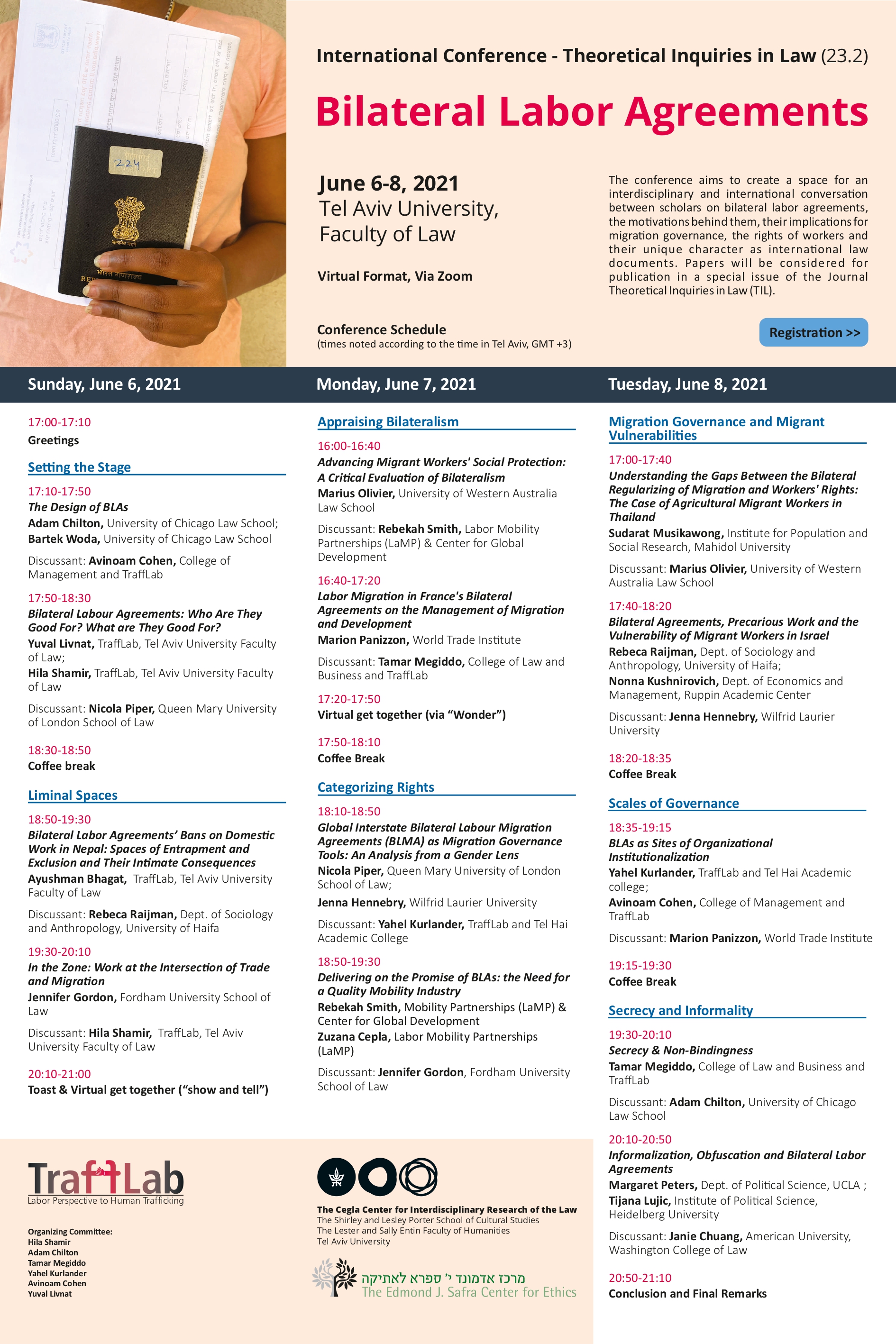Conferences
September 2021, New York University
Labor and employment law, or the law of work, seems to be situated at the heart of private law, at least in its intuitive understanding as the law that governs our interpersonal relationships as individuals (rather than as citizens). Yet contemporary private law theory pays little attention to employment and labor law. Issues like the implications of private ownership of the means of production, the problem of unequal bargaining power and consent within the employment contract, or the proper understanding of assumption of risk or restraint of competition among workers no longer occupy most theorists of property, contract, and tort law.
Scholars of labor and employment law similarly avoid the questions that animate private law theory. Since the early 20th century, they have tended to understand private law as “the other” against which their field had struggled for independence. Some scholars of the law of work would align themselves with public law, centering issues of liberty, equality, justice, and democracy. Most tend to regard their field, and the subject of work itself, as sui generis and as defying the public law-private law dichotomy.
We think that this predicament raises questions and potentially points to missed opportunities. The dramatic transformation of work in recent years and private law theory’s recent renaissance make a reconsideration of the distance between the fields particularly timely. The conference will bring together scholars from both fields to present and discuss papers that explore this state of mutual disregard and the potential for fruitful dialogue.
- The Code of Capital: How the Law Creates Wealth and Inequality – Book Event
December 14, 2020, Tel Aviv University, Buchmann Faculty of Law
Capital is the defining feature of modern economies, yet most people have no idea where it actually comes from. What is it, exactly, that transforms mere wealth into an asset that automatically creates more wealth? The Code of Capital explains how capital is created behind closed doors in the offices of private attorneys, and why this little-known fact is one of the biggest reasons for the widening wealth gap between the holders of capital and everybody else.
In this revealing book, Katharina Pistor argues that the law selectively “codes” certain assets, endowing them with the capacity to protect and produce private wealth. With the right legal coding, any object, claim, or idea can be turned into capital—and lawyers are the keepers of the code. Pistor describes how they pick and choose among different legal systems and legal devices for the ones that best serve their clients’ needs, and how techniques that were first perfected centuries ago to code landholdings as capital are being used today to code stocks, bonds, ideas, and even expectations—assets that exist only in law.
April 22, April 29, & May 6, 2021, Tel Aviv University, Buchmann Faculty of Law (via Zoom)
Privacy studies are an emerging cross-disciplinary field of study. The annual workshop on privacy and cyber studies is a platform for presenting and discussing cutting edge studies on privacy. Participants are typically from a broad range of disciplines: computer science, information systems, engineering, law, media studies, psychology and sociology, economics and more. The workshop is based on a call for papers, and submissions are carefully selected.
Please check here for the Schedule.
- Probable Justice: Risk, Insurance, and the Welfare State, Dr. Rachel Z. Friedman – Book Launch
May 18, 2021, Tel Aviv University, Buchmann Faculty of Law (via Zoom)
Co-sponsored hosted by The David Berg Foundation for Law and History, The Buchmann Faculty of Law
Decades into its existence as a foundational aspect of modern political and economic life, the welfare state has become a political cudgel, used to assign blame for ballooning national debt and tout the need for personal responsibility. At the same time, it affects nearly every citizen and permeates daily life—in the form of pension, disability, and unemployment benefits, healthcare and parental leave policies, and more. At its core is the idea of social insurance, which provides event-conditioned benefits through a publicly orchestrated system of contributions and distribution. First proposed around the time of the French Revolution, such policies began to spread throughout Western Europe toward the end of the nineteenth century, and today constitute one of the largest budgetary items in wealthy democracies.
Probable Justice offers an account of how and why social insurance became one of the central distributive mechanisms in liberal democratic states. Focusing on mathematical probability theory, it argues that social insurance is a distributive regime that by its nature combines distinct principles and aims, including individual liberty, social equality, and solidarity. Through a historical and conceptual analysis of this practice, from its earliest articulations through the advanced welfare state, Probable Justice highlights the ambiguity and the plasticity—the theoretical challenges as well as the practical strengths—of a defining feature of modern politics.
- Bilateral Labor Agreements
6-8 June, 2021, Tel Aviv University, Buchmann Faculty of Law
Co-sponsored and hosted by the TraffLab (ERC) research project and the Cegla Center for Interdisciplinary Research, TAU.
Bilateral Labor Agreements (BLAs) are international agreements entered into between two sovereign states, in which they agree on the terms under which the nationals of one state (or both) are able to temporarily migrate to the other state for work. Academics have only recently begun to turn their attention more systematically to BLAs. According to the highest estimate, states have so far entered into at least 600 BLAs. Initially, BLAs were signed primarily between Global North, rich and developed countries on the one hand, and Global South, poorer developing countries on the other hand. However, the make-up of BLAs has since shifted to include more South-South agreements as well. States’ choice to regulate labor migration in an exclusively bilateral manner is not a common one in international law. However, a broad multilateral agreement was never successfully reached around regulating labor migration, and not for lack of effort. Although countries have entered into BLAs since at least the end of WWII, many important facts about these agreements are still open questions. Why do migrationreceiving countries enter into bilateral labor agreements when they can unilaterally regulate incoming migration? What can BLAs reveal about the changing position of nation states and about the role of migrants in today’s global order, and how does the coronavirus pandemic shed light on these questions? And why has multilateralism failed in the context of labor migration? Some BLAs aim to reduce or eliminate high recruitment fees paid by migrants, and guarantee human and workers’ rights throughout the migration cycle, thus reducing the risk of severe forms of labor market exploitation and human trafficking,3 but are they effective? Academic literature offers some answers to these important questions. But many other aspects of the burgeoning trend of BLAs remain unexplored.
In this conference we seek to start a conversation between a multidisciplinary and international group of scholars on the characteristics, nature, potential and limits of BLAs as a migration governance tool.
- Justifying contract in Europe: political philosophies of European contract law, Prof. Martijn Hesselink – Book Launch
Postponed to next year (2021-22), Tel Aviv University, Buchmann Faculty of Law
This book explores the normative foundations of European contract law. It addresses fundamental political questions on contract law in Europe from the perspective of leading contemporary political theories. Does the law of contract need a democratic basis? To what extent should it be Europeanised? What justifies the binding force of contract and the main remedies for breach? When should weaker parties be protected? Should market transactions be considered legally void when they are immoral? Which rules of contract law should the parties be free to opt out of? Adopting a critical lens, the book examines utilitarian, liberal-egalitarian, libertarian, communitarian, civic republican, and discourse-theoretical political philosophies and analyses the answers they provide to these questions. It also situates these theoretical debates within the context of the political landscape of European contract law and the divergent views expressed by lawmakers, legal academics, and other stakeholders. The book moves beyond the acquis positivism, market reductionism, and private law essentialism that tend to dominate these conversations and foregrounds normative complexity. It explores the principles and values behind various arguments used in the debates on European contract law and its future to highlight the normative stakes involved in the practical question of what we, as a society, should do about contract law in Europe. In so doing, it opens up democratic space for the consideration of alternative futures for contract law in the European Union, and for better justifications for those parts of the EU contract law acquis we wish to retain.








